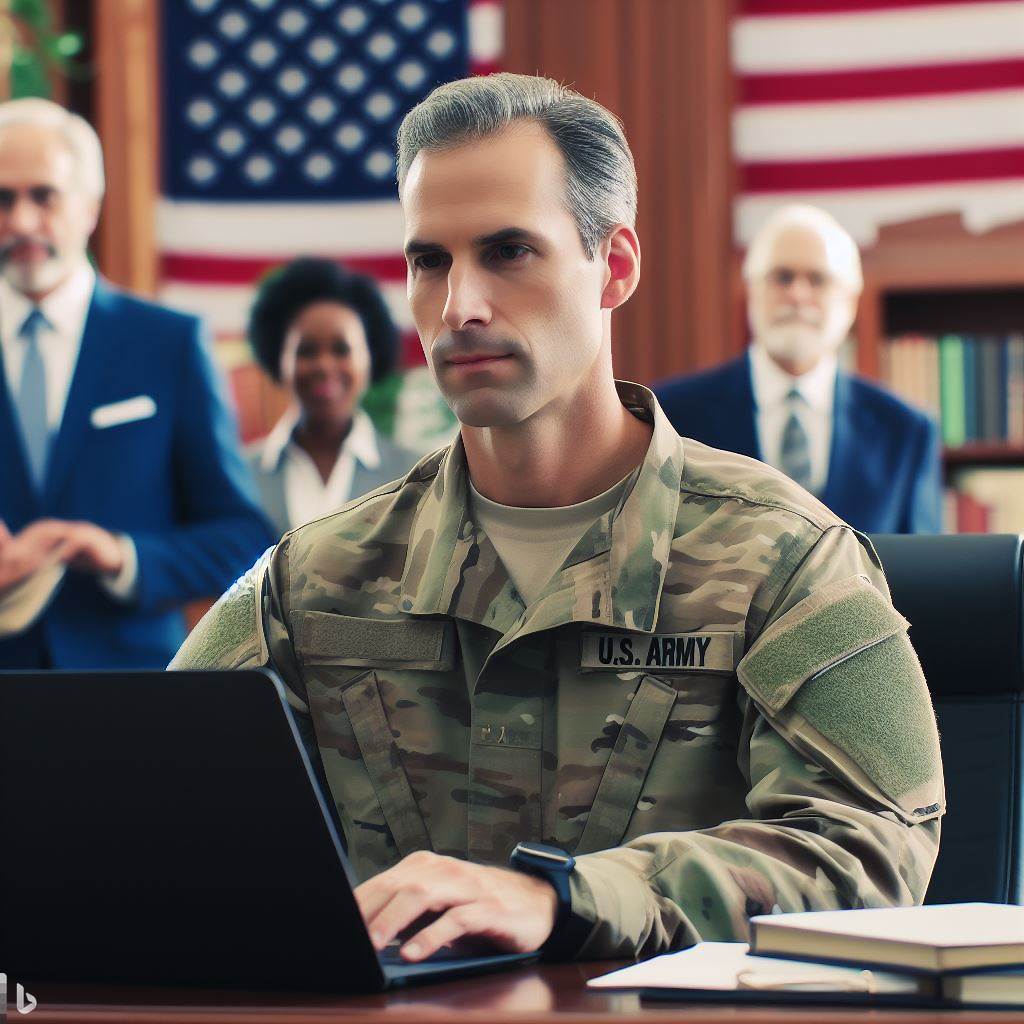Introduction
Guide for Veterans Transitioning to Security Roles in the US Market offers valuable insights into career transitions for veterans.
Making the transition from military service to civilian life can be a daunting task for veterans.
While they possess valuable skills and experience, finding the right career path can be challenging.
One area where veterans can thrive is in security roles.
A. The importance of veterans transitioning to security roles
Transitioning veterans into security roles is important for several reasons.
Firstly, it allows them to utilize their training and skills gained during their military service, such as discipline, resilience, and attention to detail.
Secondly, it provides them with a sense of purpose and a continuation of their commitment to safeguarding others.
B. Thesis statement
The purpose of this blog post is to guide veterans through the process of transitioning into security roles in the U.S. market.
It will provide valuable insights, tips, and resources to help veterans navigate this career path successfully.
From identifying transferable skills to networking strategies and resume tips, this blog post will cover all aspects of the transition.
Additionally, it will shed light on the various security roles available, both in the public and private sectors, ensuring veterans have a comprehensive understanding of the options available to them.
By providing veterans with this guide, they will have the necessary knowledge and tools to make a seamless transition into security roles.
Ultimately, this post aims to empower veterans and support them in their journey to find meaningful and fulfilling careers after their military service.
Overview of Security Roles
A. Diverse range of security roles available for veterans
- Security roles encompass a wide variety of positions such as security guards, private investigators, and cybersecurity analysts.
- Veterans can leverage their skills in areas such as situational awareness, risk assessment, and crisis management.
- Opportunities exist in both public and private sectors, including government agencies, corporate organizations, and consulting firms.
- Veterans bring unique experiences and discipline to security roles, making them valuable assets in protecting people, assets, and information.
B. Importance of security roles in various industries
- Security roles are crucial in maintaining the safety and protection of individuals, businesses, and communities.
- Industries such as healthcare, finance, transportation, and technology heavily rely on security professionals.
- Effective security measures ensure the integrity of sensitive data, prevent unauthorized access, and mitigate potential threats.
- Security roles safeguard against internal and external risks, including theft, espionage, fraud, and cyber attacks.
- Companies that prioritize security demonstrate trustworthiness, compliance with regulations, and commitment to customer safety.
C. Potential career growth opportunities within the security field
- Veterans transitioning into security roles have numerous opportunities for career advancement and growth.
- Extensive training and certifications can enhance skill sets and increase job prospects.
- Specializations like physical security management, threat intelligence analysis, and incident response offer advanced career paths.
- Leadership positions such as security supervisors, managers, or directors allow veterans to utilize their leadership skills.
- Veterans with experience in integrated security systems can explore roles in design, implementation, and maintenance.
- Advancements in technology, including artificial intelligence and data analytics, create new avenues for growth within the security field.
Essentially, the range of security roles available to veterans is extensive and diverse.
These roles are vital in various industries, ensuring safety, protecting assets, and managing risks.
Veterans transitioning into security roles are presented with numerous opportunities for career growth and advancement.
With their unique skill sets and experiences, veterans bring valuable expertise to the security field.
By leveraging their discipline and training, veterans can thrive in roles that contribute to the overall security and well-being of individuals, organizations, and society as a whole.
Advantages of Hiring Veterans in Security
A successful security team is crucial for the protection of individuals, organizations, and the nation as a whole.
When it comes to filling these essential roles, veterans bring numerous unique skills and qualities which make them perfect candidates.
Hiring veterans in the security industry has proven to be advantageous in several ways:
A. Unique skills and qualities veterans bring to security roles
- Discipline: Veterans have been trained to adhere to strict rules and maintain a high level of discipline.
- Leadership: Military experience often develops strong leadership qualities in individuals, making them effective team leaders.
- Experience with high-pressure situations: Veterans are accustomed to working in highly stressful and dangerous environments.
- Adaptability: Military personnel have the ability to quickly adapt to changing circumstances and think on their feet.
- Physical fitness: Veterans are typically in excellent physical condition, which is crucial for various security roles.
- Attention to detail: Military training instills a keen eye for detail, which is vital in security-related scenarios.
- Integrity and loyalty: Veterans often possess strong moral values, as integrity and loyalty are core principles in the military.
B. Importance of transferrable skills acquired during military service
While veterans may have specific skills related to their military roles, they also acquire numerous transferrable skills that can be utilized in the security industry.
- Communication skills: Veterans are skilled in effective communication, both verbal and nonverbal.
- Problem-solving abilities: Military personnel are trained to analyze complex situations and find practical solutions.
- Teamwork and collaboration: Veterans understand the importance of working together towards a common goal.
- Organizational skills: Military experience hones the ability to manage tasks efficiently and prioritize responsibilities.
- Crisis management: Veterans possess the ability to remain calm and make quick decisions in emergency situations.
- Technology proficiency: Military personnel often work with advanced technologies, enhancing their technical skills.
C. Statistics and research supporting the positive impact of hiring veterans in the security industry
The advantages of hiring veterans in the security industry are not merely anecdotal.
Extensive research and statistics support the positive impact they have:
- A study conducted by Syracuse University revealed that veterans employed in security roles have a lower turnover rate compared to non-veterans.
- According to a survey by the Society for Human Resource Management, more than 80% of organizations believe hiring veterans brings unique skills and abilities to the workplace.
- In a survey conducted by the U.S. Chamber of Commerce Foundation, 96% of the participating employers considered veterans to be valuable assets for their organizations.
- The Department of Labor’s Veterans’ Employment and Training Service reported that veterans demonstrate a 20% higher job performance rating than their non-veteran counterparts.
- Government programs such as the Work Opportunity Tax Credit (WOTC) provide incentives for businesses to hire veterans in various industries, including security.
To summary, hiring veterans in security roles offers numerous advantages.
Transform Your Career Today
Unlock a personalized career strategy that drives real results. Get tailored advice and a roadmap designed just for you.
Start NowTheir unique skills, transferrable abilities, and proven track record make them invaluable assets to the industry.
Additionally, research and statistics demonstrate the positive impact veterans have on organizations, leading to increased job performance and reduced turnover rates.
It is clear that veterans bring immense value to the security industry, making them highly sought-after candidates.
Read: Physical Fitness Standards and Tips for U.S. Security Guards
Challenges Veterans Face in Transitioning to Security Roles
A. Common Challenges Faced by Veterans during the Transition
Veterans often struggle with translating their military experience into security industry terms.
They may face difficulty understanding the civilian work culture and adjusting to it.
Moreover, veterans may lack specific security-related skills and knowledge required for the roles.
Transitioning veterans may find it challenging to showcase their transferable skills effectively.
Maintaining mental and emotional well-being during the transition process can also be difficult.
B. Addressing Potential Barriers, Including Lack of Necessary Certifications and Licenses
Obtaining relevant certifications and licenses is crucial to overcoming barriers in transitioning to security roles.
Veterans should research and identify the certifications and licenses required for their desired security positions.
By proactively pursuing these credentials, veterans can enhance their marketability to potential employers.
Attending specialized training programs can also help bridge the skills gap and meet industry requirements.
C. Strategies and Resources to Overcome These Challenges
Continuing education plays a vital role in equipping veterans with the necessary knowledge and skills.
Veterans can pursue degree programs, certifications, or specialized courses to fill any identified gaps.
Networking is invaluable for veterans seeking security roles as it provides access to industry professionals.
Utilizing online platforms and attending job fairs tailored for veterans can expand networking opportunities.
Veterans should also connect with organizations offering mentorship programs to gain industry insights.
Developing a well-crafted resume that highlights transferable skills and experiences is essential.
Veterans should focus on showcasing their leadership, problem-solving, and risk assessment abilities.
Seeking support from veteran service organizations can provide access to resources and guidance.
These organizations offer training, job placement assistance, career counseling, and other valuable services.
Additionally, veterans should prioritize self-care and seek support in maintaining their mental well-being.
Engaging in physical activities, connecting with loved ones, and seeking counseling if needed can help.
Showcase Your Business Today
Reach thousands of readers actively exploring professional services. Publish your business profile and grow your audience now.
Publish NowIn a nutshell, the transition for veterans into security roles presents various challenges that require proactive approaches and strategies.
Understanding these challenges, such as communication barriers and skills gaps, is crucial for successful transition.
By addressing potential barriers through obtaining necessary certifications and licenses, veterans can enhance their prospects.
Utilizing available resources, like education, networking, and mentorship programs, can facilitate the transition process.
Veterans should also prioritize self-care and seek support to maintain their mental and emotional well-being.
Through these strategies, veterans can overcome challenges and successfully transition into fulfilling security roles.
Read: Networking Opportunities for Security Professionals in the USA

Steps for Veterans Transitioning to Security Roles
A. Researching and understanding the different security roles and requirements
Before transitioning to security roles, veterans must first conduct thorough research to understand the various security roles available in the U.S. market.
This step involves gaining knowledge about the specific requirements, skills, and qualifications needed for different security positions.
B. Assessing individual skills and identifying areas for improvement
Next, veterans should assess their own skills, experiences, and strengths to identify areas where they excel and areas that may require improvement.
This self-assessment will provide a clear understanding of how their military background aligns with the requirements of security roles and highlight areas for skill development.
C. Pursuing necessary certifications, training programs, or additional education
Upon identifying areas for improvement, veterans should pursue necessary certifications, training programs, or additional education to enhance their skills and meet the requirements of security roles.
This could involve obtaining industry-recognized certifications or enrolling in relevant training courses to acquire specialized knowledge.
D. Building a professional network within the security field
Building a professional network within the security field is crucial for veterans transitioning into security roles.
This can be achieved by attending industry events, joining professional associations, and connecting with security professionals through platforms like LinkedIn.
A strong network can provide valuable insights, job opportunities, and mentorship.
E. Tailoring resumes and cover letters to highlight relevant military experience
Veterans must tailor their resumes and cover letters to emphasize their relevant military experience and how it translates to the skills required in security roles.
Highlighting leadership, attention to detail, problem-solving, and teamwork skills gained during military service will make their applications stand out to employers in the security industry.
To summarize, transitioning to security roles requires veterans to follow a series of steps to ensure a successful career switch.
Thoroughly researching security roles, assessing skills, pursuing certifications, building a network, and tailoring resumes position veterans as competitive U.S. candidates.
With dedication and preparation, veterans can leverage their military experience to excel in the security field.
Read: Impact of COVID-19 on Security Guard Services in the United States
Resources and Support for Veterans Transitioning to Security Roles
A. Organizations and Programs
- Veteran Jobs Mission: A coalition of over 200 companies committed to employing veterans, focusing on security roles.
- Hire Heroes USA: Offers free career counseling, job placement assistance, and resume writing services for veterans.
- Wounded Warrior Project: Provides resources, mentorship, and job placement assistance to wounded veterans.
- American Corporate Partners: Offers mentoring programs connecting veterans with corporate professionals in the security industry.
- Disabled American Veterans: Provides support with healthcare, education, and employment specifically for disabled veterans.
B. Online Platforms and Job Boards
- Military.com: Offers a dedicated job board for veterans seeking security roles, connecting them with relevant employers.
- SniperJobs.com: Specializes in matching veterans with positions in the security industry, including roles as snipers or sharpshooters.
- ClearanceJobs.com: Focuses on security clearance positions and connects veterans with government and defense contractors.
- Hirepurpose: Provides job listings and resources for veterans transitioning into various industries, including security.
- VeteransJobExchange.com: Offers a wide range of job opportunities specifically targeted at veterans, including security roles.
C. Mentoring and Coaching
- American Legion’s Operation Comfort Warriors: Supports veterans through various programs, including mentoring and coaching initiatives.
- FourBlock: Provides career readiness programs, mentorship, and networking opportunities for veterans seeking security roles.
- Veterati: Connects veterans with mentors from various industries, including security, offering guidance and advice.
- Vets2PM: Offers project management training and mentoring to veterans interested in security roles within the field.
- Veterans-Mentoring-Veterans: A platform that facilitates mentorship among veterans, providing support during the transition to security roles.
These resources and support systems ensure veterans have access to the tools and guidance necessary for a successful transition into security roles.
Whether through dedicated organizations, job boards, or mentorship opportunities, veterans can find the support they need to excel in their new careers.
Read: Balancing Vigilance and Courtesy: A U.S. Security Guard Challenge
Learn More: Police Officer Safety: Gear, Training, & Best Practices
Employer Perspective on Hiring Veterans in Security
A. Reasons why employers value veterans in security roles
- Leadership Skills: Veterans have undergone rigorous training, developing strong leadership abilities that are highly valued in security roles.
- Discipline and Work Ethic: Employers appreciate the discipline and work ethic instilled in veterans through their military experience.
- Problem-solving Abilities: Veterans are trained to think critically and make quick decisions, making them invaluable in security-related situations.
- Adaptability: Employers recognize that veterans can adapt to challenging and unpredictable environments, essential traits in security positions.
- Teamwork and Collaboration: Veterans have experience working collaboratively, making them excellent team players in security settings.
- Attention to Detail: Military training emphasizes attention to detail, a crucial skill in security positions where meticulousness can save lives.
B. Benefits for companies hiring veterans and fostering a diverse workforce
- Enhanced Security Culture: By hiring veterans, companies create a security-oriented culture, emphasizing safety and vigilance within the organization.
- Diverse Skill Sets: Veterans bring a diverse range of skills and experiences, adding depth and breadth to company teams in security roles.
- Reduced Turnover and Increased Retention: Veterans tend to have lower turnover rates, showing loyalty and commitment to their employers.
- Cost Savings: Companies can save costs by hiring veterans due to their eligibility for tax credits and government-funded training programs.
- Positive Public Image: Companies that prioritize hiring veterans enhance their public image, showing support for veterans and social responsibility.
C. Testimonials and success stories from employers who have hired veterans in security roles
- “Hiring veterans has been a game-changer for our security team. Their leadership and problem-solving skills have elevated our overall security measures.” – AlliedBarton Security Services Security Director
- “Veterans bring a unique perspective to our security operations. Their adaptability and attention to detail have significantly improved our risk mitigation efforts.” – Target CEO
- “We have seen a dramatic reduction in security incidents since hiring veterans. Their discipline and teamwork have created a safer work environment.” – Lowe’s HR Manager
- “Veterans have brought invaluable training and expertise to our security team. Our clients have praised their professionalism and dedication.” – ADT Security Systems Security Coordinator
- “Our decision to hire veterans in security roles has not only strengthened our security measures but has also had a positive impact on our company culture.”- Walmart Head of Human Resources
Employers recognize and value the unique skills and qualities that veterans bring to security roles.
The leadership, discipline, problem-solving abilities, adaptability, teamwork, and attention to detail that veterans possess make them ideal candidates.
Hiring veterans not only enhances a company’s security culture but also fosters a diverse workforce.
The testimonials and success stories from employers further solidify the positive impact veterans have on security operations.
By prioritizing the hiring of veterans, companies can benefit from their skills, experience, and commitment, while also showcasing their support for veterans and social responsibility.
Conclusion
A. Recap of key points discussed in the blog post:
- Veterans possess valuable skills and experiences that make them well-suited for security roles.
- Transitioning to the security industry can provide veterans with stable and fulfilling careers.
- Security employers should recognize the unique advantages of hiring veterans and actively seek to recruit them.
- Training and certification programs, as well as networking opportunities, can support veterans in their career transition.
B. Final thoughts on the significance of veterans transitioning to security roles
By investing in veterans’ transition to security roles, society benefits from their expertise, dedication, and commitment to protecting people and assets.
Additionally, veterans find purpose and stability as they embark on a new section in their professional lives.
C. Encouragement and support for veterans pursuing careers in the security industry
To all veterans considering careers in security, know that your skills are highly valued and in-demand.
Take advantage of resources available to you, such as job fairs, mentoring programs, and professional development opportunities.
The security industry is waiting to welcome and benefit from your expertise. Go ahead and make your mark!
[E-Books for Sale]
The Big Book of 500 High-Paying Jobs in America: Unlock Your Earning Potential
$19.99 • 500 High-Paying Jobs • 330 pages
Explore 500 high-paying jobs in America and learn how to boost your career, earn more, and achieve success!
See All 500 High-Paying Jobs of this E-Book
1001 Professions Without a Degree: High-Paying American Jobs You Can Start Now
$19.99 • 1001 Professions Without a Degree • 174 pages
Discover 1001 high-paying jobs without a degree! Unlock career tips, skills, and success strategies for just $19.99!




